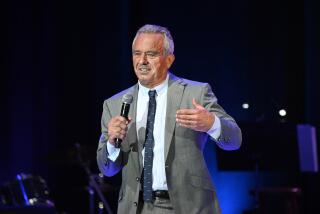Teenage Pregnancy Risk Rises With Second Births, Study Finds
- Share via
One teenage pregnancy does not present a health risk, Scottish researchers have found, but subsequent pregnancies during the teen years do.
The study contradicts previous findings that initial teen pregnancies are a hazard, and is the first to find that subsequent pregnancies produce a greater risk.
Dr. Gordon C.S. Smith of the University of Glasgow and his colleagues identified 110,233 nonsmoking Scottish women, ages 15 to 29, who gave birth for the first or second time between 1992 and 1998. They reported in the Sept. 1 British Medical Journal (https://www.bmj.org) that the women ages 15 to 19 who gave birth for the first time suffered no higher risk of adverse effects than the women ages 20 to 29. But second births among the same group of women were associated with a threefold increase in the risk of extremely premature birth and stillbirth, compared to the older women.
The researchers offered no potential explanations for the increased risk. But they suggested that the discrepancy with respect to previous studies arose because those earlier reports did not control for the effects of smoking, which is known to increase the risk of adverse outcomes in pregnancy.
Paramedics Can Safely Deliver Seizure Drugs
Paramedics transporting patients undergoing epileptic seizures can safely administer benzodiazepines to stop the seizures, according to researchers from UC San Francisco.
Many communities already allow paramedics to administer the drugs, but many physicians believe that they should be administered only in a hospital because of potential complications. There has never been a study to determine their safety when administered by paramedics.
Dr. Brian Alldredge and his colleagues studied 205 patients with “status epilepticus,” continuous or repeated seizures lasting 5 minutes or more without the recovery of consciousness, who were transported to area hospitals by ambulance. About half of the patients had epilepsy, while the rest had seizures resulting from alcohol abuse, drug abuse, stroke or head trauma. The patients received either diazepam, lorazepam or a placebo.
The team reported in the Aug. 30 New England Journal of Medicine (https://nejm.org) that 43% of those receiving diazepam were free of seizures by the time they reached the hospital, as were nearly 60% of those receiving lorazepam. In contrast, only 21% of those receiving a placebo were seizure-free.
They also found that twice as many of the patients receiving a placebo developed breathing or circulatory problems after they reached the hospital.
Flaxseed May Lower Breast Cancer Risk
Eating flaxseed may reduce the risk of breast cancer by lowering levels of two hormones thought to be involved in its genesis, according to Minnesota researchers.
Dr. Joanne Slavin of the University of Minnesota and her colleagues studied 28 postmenopausal nuns who live in a convent in St. Joseph, Mich. The women were chosen because of their strict diets, which limited the complications that might arise from other foods.
The volunteers in the yearlong study were given daily supplements containing 0 grams, 5 grams or 10 grams of ground flaxseed. The maximum dose was the equivalent of about a tablespoon. The researchers found that both dosages of the flaxseed supplements lowered the levels of the estrogens estrone sulfate and estradiol. “If we can alter estrogen levels, we can hope to prevent cancer,” Slavin said.
Researchers from Duke University Medical Center reported in July that eating flaxseed could lower men’s cholesterol and testosterone levels, thereby reducing the risk of prostate cancer.
Seizures From Vaccines Don’t Have Lasting Effects
The widely used DTP and MMR vaccines occasionally cause seizures in children who receive them, but the seizures apparently produce no long-term effects, according to a new study.
The diphtheria-tetanus-pertussis and measles-mumps-rubella vaccines are now given to most children, although some parents refuse them because of the mistaken belief that they cause autism.
Dr. William E. Barlow of the Group Health Cooperative in Seattle and his colleagues studied 679,942 youngsters at four large West Coast HMOs for seven years.
They reported in the Aug. 30 New England Journal of Medicine (https://nejm.org) that the risk of febrile seizures--seizures caused by a high fever--was six times higher than normal on the day that children received the DTP vaccination and was three times normal eight to 14 days after an MMR shot. That translates to an additional six to nine seizures for every 100,000 children getting the DTP vaccine and 25 to 34 per 100,000 for those getting MMR.
During the follow-up, however, the team found that the children who suffered seizures were no more likely than other children to have additional seizures or mental or developmental problems.
Seniors’ Surgery Risk Higher Than Realized
The risk of the elderly dying during elective surgery is higher than generally cited in surgical textbooks and higher than many doctors believe, a new study has found.
Dr. John D. Birkmeyer and Dr. Emily Finlayson of the VA Medical Center in White River Junction, Vt., analyzed data from 1.2 million patients over the age of 65 who underwent elective surgery between 1994 and 1999.
They reported in the July/August issue of Effective Clinical Practice that patients had a one in 25 chance of dying from procedures such as carotid endarterectomy (removal of fatty plaque from the carotid arteries of the neck), removal of the kidney or removal of part of the bowel. For procedures such as cardiac bypass surgery and removal of part of the lungs, the risk was between 4% and 9%. For removal of a lung or the esophagus, the risk was greater than 9%. All are substantially higher than doctors had believed.
They also found that the risk of death increased with age. For most procedures, the risk of death for patients age 80 or older was twice the risk for patients age 65 to 69.
*
Medical writer Thomas H. Maugh II can be reached at thomas.maugh@latimes.com.






